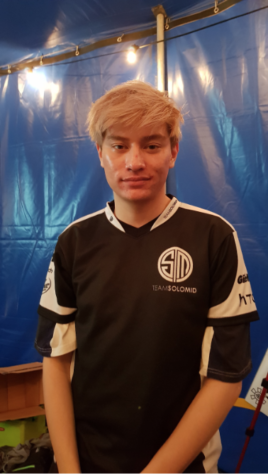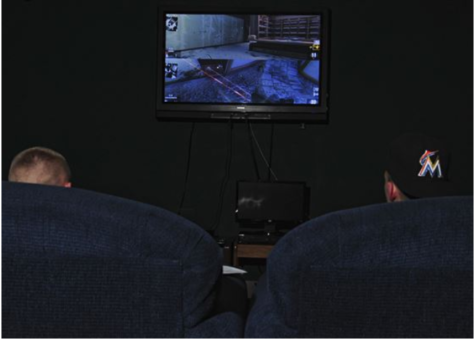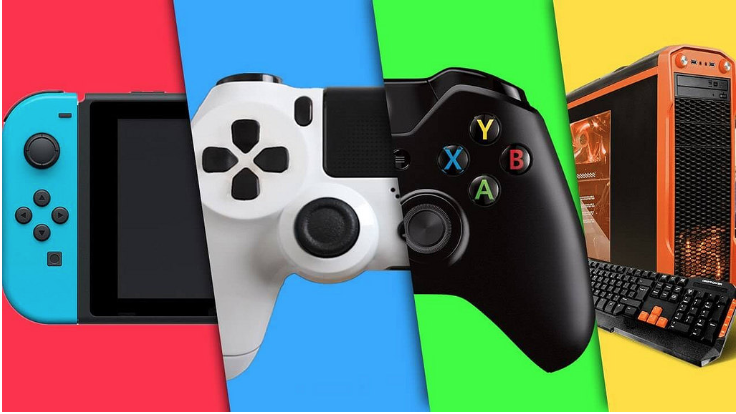Video games shouldn’t become a sport
January 17, 2019
Video games have always been a “problem” in the face of the media. Countless reports have pointed them to be detrimental to the youth, a waste of time, or just utter nonsense. Of course, these accusations are not true and only showcase why people are becoming more accepting of video games as the years go by.
Video games are evidently cherished by fans and will forever stay as a prominent form of entertainment in the lives of many, no matter how hard news media outlets try to portray them to be a bad thing. In spite of it being okay to have a deep love for video games, many people are taking said love to the extreme, arguing that they could eventually be considered a sport in the near future.
Interestingly, this conclusion is not far off from a possibility seeing how video games have many things going for them. According to the oxford dictionary definition of sport, a sport can be defined as, “An activity involving physical exertion and skill in which an individual or team competes against another or others for entertainment.” Based on the definition alone, video games clearly fit the bill as to what can be considered a sport. In addition, you can also make a career out of them, and play in teams. They are accessible to everyone, involve a lot a practice to get good at, and one can get sponsorships, so why shouldn’t it be a sport?
Well, although video games may appear to fit the criteria as to what could be considered a sport, the existence of such a sport would pose an impediment for many to prosper in the competitive scene, and convert the entertainment purposes of video games to competition for the more casual audience.
Sophomore Thomas Bajor certainly agrees with this idea, questioning the legitimacy of many wanting to become professional gamers already: “I think that in today’s times, where you can basically make a living out of anything and not go to school, more and more people are drawn into wanting to become professional gamers. I believe that someone wanting to achieve this goal doesn’t realize the fact that it takes time and devotion to really become, the best of the best, and that they would have to set aside other aspects of their lives.”
Bajor further noted, “If video games were to become a sport, I think it would draw more people in wanting to make a career out of gaming, but as I said before, it would cost them a lot to make a career out of a field where it is already hard to get noticed by professional gaming teams or companies.”
Like Bajor, many people already understand the difficulty of even becoming a professional gamer in the first place. If video games were to be considered a sport, professional gamers would still have to face more challenges to be set forward, that should evidently be discouraged for many aspiring to achieve this career in their lives.
Health Issues Ought Not to be Glorified
In the event that video games were to become a sport, there is no doubt that the competitive scene will skyrocket with many newcomers wanting to become noticed by professional teams. To do this, however, one would need to go through hours of practice and devotion to a particular game to become a “pro.”
Whereas this mindset for many athletes is in fact beneficial to the human body, the same could not be said for gamers.
According to a report by LIVESTRONG on the negative side effects of excessive gameplay, reporter Drea Christopher notes several issues that professional gamers may face as a result of their practices. In the report, Christopher provided studies revolving around mental health stating, “The University of Texas at Dallas notes that the addiction can lead to such medical issues as backaches, headaches, eye strain and carpal tunnel syndrome–pain and numbness that [one] may feel in [their] wrists, hands, shoulders and elbows.”
Christopher also points out the aggression many players may develop as a result of exposure to a highly competitive game stating, “Richard Gallagher, director of the NYU Child Study Center’s Parenting Institute, states that players who become engrossed in first-person shooter-style video games, for example, may adopt a detached view of society or develop aggressive thoughts and tendencies.”
This aggression is certainly reminiscent within many gaming communities, as there have been many incident where players were “salty,” or in other words, angry at how badly they lost to their opponent. Although these moments are humorous to watch, they do underscore the effects that competitive gameplay may have on many players, especially on the many newcomers to come as a result of video games becoming a sport.
To add further notice to this issue, the overall routine that many players go through is troublesome to their physical health seeing how they have little to no exercise, and a lack of nutrition in their body.
This notion can be seen in an article put out by ESPEN following the routine of professional gamers, when author Tyler Erzberger states, “In team houses, players wake up, eat together, practice together, eat together again, practice together again and then sometimes even share rooms with their teammates without any time to themselves.”
Erzberger also notes that, “On average, during a competitive season, players will get maybe one day off a week to themselves, with the rest littered with scrimmages and individual practice.”
This sort of routine, of course, does not make for a healthy lifestyle that many should aspire to when wanting to become a professional gamer. The human body needs exercise. It needs sufficient food to go throughout the day. The mind needs solitude and time to reflect on other more personal issues.
With the practice routines evidently being detrimental to one’s health in the long run, it’s critical to question whether or not professional gamers should be glorified for their efforts. If video games were to become a sport, this unhealthy lifestyle will undoubtedly be heavily prevalent among many players wanting to become “the very best.”
Sophomore Jeffrey Lesnik responded to the side effects of excessive gameplay: “I feel that many people would overlook these types of health issues when wanting to become professional gamers, and I think that these health issues are not worth it to become the best at a video game, something of which should not be taken seriously as many people are doing.”
As Lesnik reminds us, these health issues should not be at the cost of one becoming good at a video game, and instead should be addressed within the gaming community.
All this isn’t to say that video games should be discouraged from people. Rather, it underscores why they should be limited to nothing more than a pastime, instead of a sport that many will take seriously.
An Ever-Changing Environment
With the health side of video games evidently being detrimental in the long run for a professional gamer, it is also important to take note of whether or not being a professional gamer of a particular game even pays off as the competitive scene evolves throughout time.
Over the years, many competitive games have come and gone. This is to be expected when considering the fact that some just get bored of an old game, and instead become fascinated by the new mechanics introduced in a new upcoming game.
Take for instance the renowned Super Smash Bros. series, and it’s second iteration Super Smash Bros. Melee. This Nintendo title for the Gamecube is heavily competitive and years old, yet there are still many professional gamers making thousands of dollars out of the game in tournaments such as EVO, Apex, and DPG to name a few.

Out of the many “pro gamers” of the game, Sweden player Leffen stands out for the experience with the competitive scene all together.
He was always trying his best to become the best, setting aside several hours to beat the top players at the time. At one point in his career, unfortunately, he was banned from all European tournaments for his unsporting behavior towards other players, and his negative remarks over a handicapped child.
Throughout this period, he didn’t have the alternative to play Melee in the U.S., and instead resorted to other titles such as Marvel vs. Capcom 3 and Dragon Ball FighterZ. According to the 24 year old Sweden, he stated that though the new games appeared extremely different from Melee, he was able to translate his skills over given time: “My fundamentals have always been, because like I’m the type of player I think that, once you know a situation fully or like understand fully enough and just like run in, and do things out of feeling.”
Leffen found success out of Dragon Ball FighterZ specifically, despite not being used to more traditional fighting games.
Though this is an impressive feat coming out of someone like Leffen, it is important to note that this simply can’t be the case for many players. When video games become a sport, more and more games will be released that focus on this new market of competitive gameplay, and it would be difficult to adapt to the constant changes and updates being made to a particular formula, that may or may not serve one’s preferences in competition.
This in fact can be seen when Leffen transitions from competitive Melee to the new entrance in the Super Smash Bros. series, Super Smash Bros. Ultimate. Earlier this year, Leffen entered 2G Gaming, a tournament for Super Smash Bros. Ultimate, in which he placed 7th place.
This placing by no means is a bad thing for the average player, but to someone who was previously placed 1st in a Super Smash Bros. Melee tournament at EVO 2018, it underscores the fact that not everyone can translate their skills to a newly desired game, especially when the two Smash titles are 17 years apart and include several changes such as new mechanics, new characters, and several other changes to balance out gameplay.
If video games were a sport, this issue would still be prevalent. It would pose a threat to one’s career when considering that they would have to transition to the new game in town that dominates the competitive scene. One would need to constantly adapt to an ever-changing environment.
No More Fun
These issues of health and adaptation will of course have a detrimental impact on professional gamers. Yet, what most don’t realize about these possibilities would be the fact that the impact will extend onto more casual players and game developers.
With the obvious goal now being to make games more competitive to meet the needs of the so called sport, game developers will now put their focus on making great competitive games to make a profit in this new business.
At the same time, the more casual audience looking to play games for fun or as a pass time will have few options.
Of course, there will always exist games made for fun, including ones that focus on gameplay experience over competitiveness. No one denies that.
The point is that this new market detracts the very purpose as to why videogames were even created. They shift video games from being nothing more than a pass time, to a competitive career that few can even achieve. This new statement will discourage many to playing video games if their new purpose is to be competitive.
We can already see this idea into play at a much smaller scale in terms of the game that took the world by storm, Fortnite.
Before its release, however, there was PUBG (PlayerUnknown’s Battlegrounds). The game was a 100 player Battle Royal, in which players would go up against each other until there was only one player left standing.
Although the Battle Royal play style was not a new thing PUBG introduced, the game caught the attention of many game developers for the success it had among fans of this formula.
Only a few months later, Fortnite was released to the public, and it dominated the competitive scene. The game was a massive success for its introduction of the mechanic of building, with Fortnite soon going on to eradicate the competition between PUBG, leaving the former battle royal game in it’s shadow.
According to Sophomore Daniel Ottaviano, he believes that competition among game developers would be an issue to be concerned about: “Do I believe video games will one day become a sport, no. But I will say that in the case that they do, game developers will obviously be quick to jump into making new competitive games that in their opinion, will sell.”
As Ottaviano stated, game developers create the best competitive games that may be played at many tournaments. This, of course, would detract the current value that videogames hold. In addition, the new dominant scene of competitive play will discourage new comers wanting to play more casual or story based games.

In short, video games and their players will be at great risk if they were to become a sport. The health issues common among professional gamers, along with the focus of games shifting to meet the needs of a more competitive scene, sports, will yet again redefine gaming, but for the worst.
It is all the more important to preserve video games as nothing more than a pastime. They shouldn’t be taken seriously, as they are just games at the end of the day. Being skilled a competitive game, holds no real value in life that shouldn’t be congratulated, but rather discouraged.
Yes, it would be amazing to make money out of nothing but pure talent at a particular game, but the consequences of that choice far outweigh the benefits. If gamers truly have the passion for video games that they so claim, they should remain as the form of entertainment that so many enjoy on their free time.


